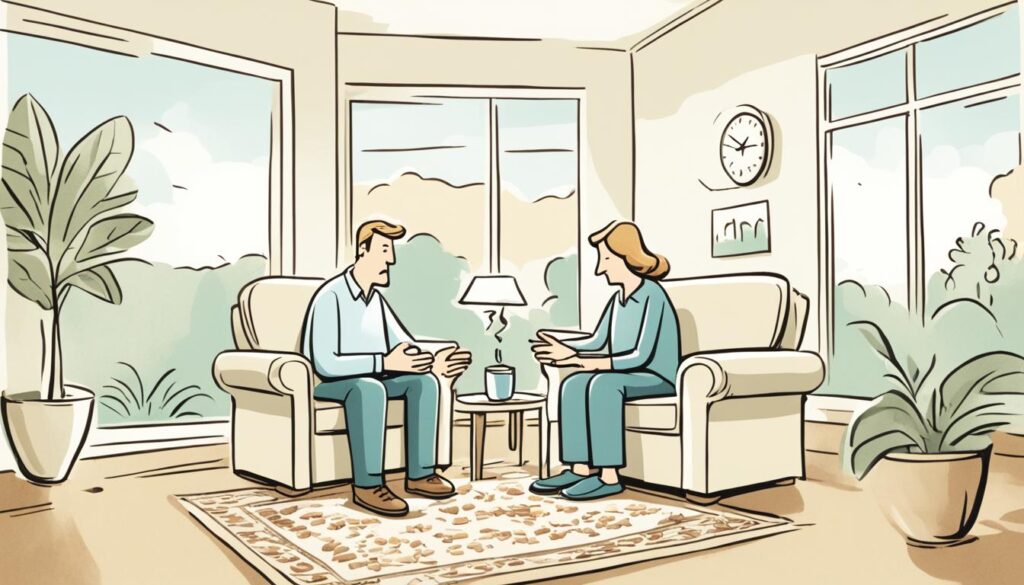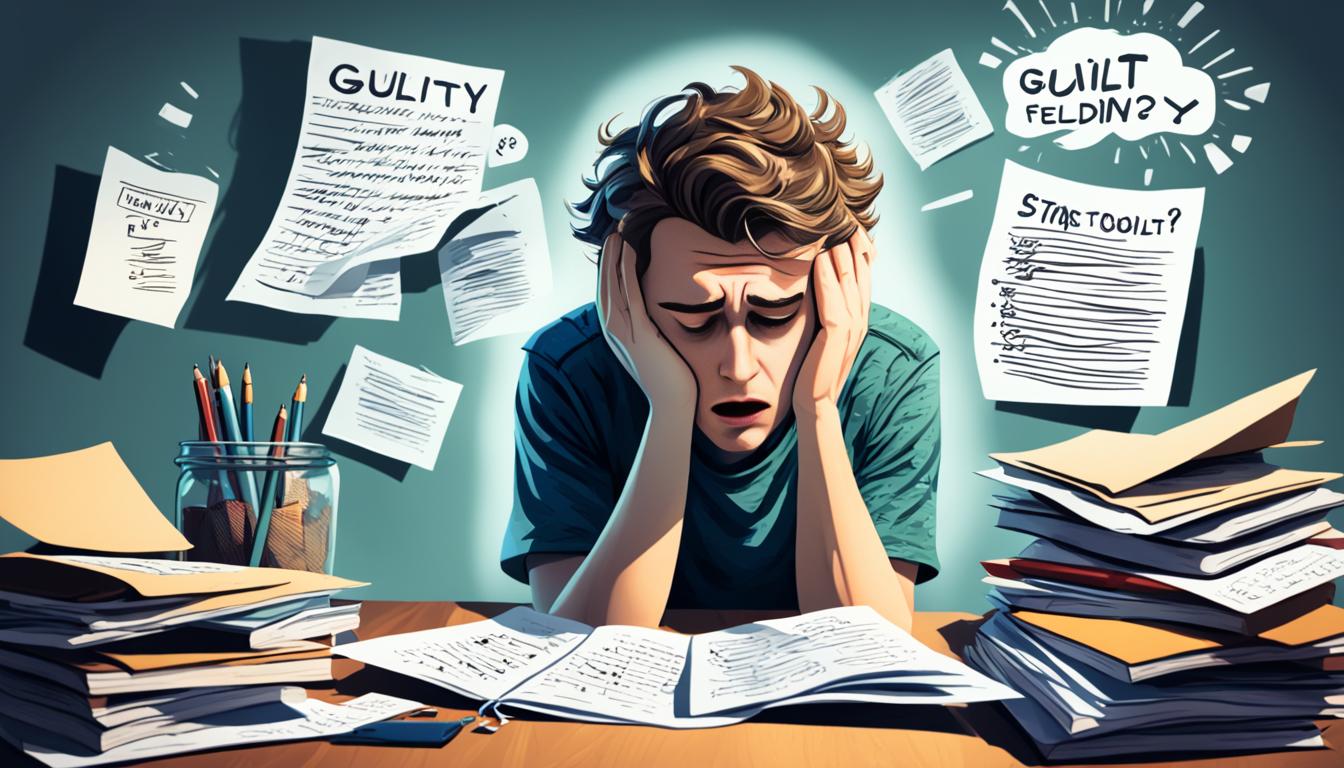How to Not Feel Guilty About Everything (7 Tips)
Feeling guilty all the time is more common than you think. Guilt can fill your mind, stopping you from being happy. It’s a tough thing to deal with. It affects how we feel about ourselves and our lives.
But imagine if you could stop feeling guilty for everything. We’ll look at seven ways to do just that. Are you ready to drop the guilt and feel at peace? Let’s start.
Understanding Guilt
Guilt is an emotion we all feel, coming from many sources. It can come from making mistakes, hurting others, or not living up to what we expect of ourselves. Guilt shows us our faults. But not all guilt is the same. Knowing the types of guilt can help us handle it in a good way.
Healthy guilt has a role. It lets us see our wrongs, learn, and fix them. It reminds us of our morals and pushes us to choose better next time. This guilt means we’re growing and wanting to improve.
But, too much guilt, or toxic guilt, is bad for us. It’s more than just thinking over and fixing our actions. It’s a heavy load that brings us down. It can make us feel shameful and anxious and even lead to depression.
We need to tell healthy guilt from excessive guilt. It’s key to remember guilt is normal and can be good. Knowing when guilt is too much and hurts us is important.
Understanding guilt’s subtle differences helps us deal with it better. Next, we’ll look at ways to handle guilt, be kinder to ourselves, and have a healthier self-relationship.
Awareness and Acknowledgment
The first step to managing guilt well is to acknowledge and recognize it in your life. Avoiding or suppressing guilt only makes it stronger. So, instead, spend time on self-reflection to pinpoint what’s causing it.
Knowing your guilt lets you understand why it’s there and tackle it head-on. By recognizing guilt, you start to look into why it came up and its effects on you. This self-reflection helps you see things more clearly and take steps to handle your guilt.
When you admit you’re guilty, be kind to yourself. Feeling guilt is normal and shows you have a heart. It means you care about how your actions affect others and yourself.
- Reflect on your feelings and thoughts. Writing them down can help.
- Figure out what actions or situations make you feel guilty.
- Think about the beliefs and values that might be driving your guilt.
- Try to see if your guilt makes sense or comes from too high expectations.
You take charge of your emotions by acknowledging and recognizing guilt through self-reflection. This is a key step toward being more self-aware. It also opens the door for self-forgiveness and personal growth.

Rationalizing the Guilt
Now you’re acknowledging your guilt, so it’s time for the next step. Rationalizing guilt means you question the bad things you tell yourself. You then replace those thoughts with kinder, more realistic ones. It’s key to remember that everyone messes up. Your guilt doesn’t show your true worth.
Caught in negative self-talk? It’s time to change the script. Tell yourself it’s normal to make mistakes. Focus on learning from them instead of feeling down. This can help you grow.
Is your guilt reasonable or not? Think about if you’re blaming yourself for things you couldn’t control. Or for things not really your fault. Asking these questions can help you see your guilt differently.
Try shifting from negative self-talk to positive affirmations. Speak to yourself with kindness. Highlight your strengths, achievements, and good traits. Positive thoughts can balance out the guilty feelings.

Dealing with guilt means looking inward and challenging negative thoughts. It’s a process that needs time, regular effort, and patience. Be kind to yourself along the way. Remember, the aim is not to remove guilt completely. It’s about separating useful guilt that leads to growth from harmful guilt that stops you.
Setting Realistic Expectations
Feeling guilty often comes from setting goals too high for ourselves. It’s vital to remember you’re human and will err. Aim for goals that match what you can do and your limits. This approach helps lessen guilt and supports a healthier mindset.
Being kind to yourself is crucial when you don’t meet your goals. If you’re too hard on yourself, try offering kindness and forgiveness instead. Everyone faces challenges. Learning from mistakes without guilt is part of growing.
It’s key to know that not everything is within your control. Life comes with unknowns. Seeing mistakes and failures as chances to grow is important. Let go of guilt from not meeting every goal. Know that you’re deserving of love and respect, no matter what.
The path we take is often more important than the ending. Celebrate your progress, even if it’s not exactly what you planned. Focus on growing stronger and bettering yourself more than on specific results. With realistic goals, kindness to yourself, and acceptance, life becomes more joyful and lighter.

Stop Negative Self-Talk
Negative self-talk can hurt your mental health, leading to guilt and shame. It’s key to fight these negative thoughts. Replace them with positive affirmations that support self-care and kindness to yourself.
Don’t focus on self-critical thoughts. Remember your value and celebrate your strengths. Engage in things you love to care for yourself. It can be a hobby, a nature walk, or time with friends and family. Choose activities that make you feel good.
To beat negative self-talk, list positive affirmations. They can remind you of your abilities, strengths, and values. Say these affirmations every day. This helps fight negativity and develops a positive outlook.
Here are a few positive affirmations to get you started:
- I am deserving of love and acceptance.
- I am enough just as I am.
- I have the power to overcome challenges.
- I am in control of my thoughts and emotions.
- I am worthy of happiness and success.
Self-care and kindness to yourself are vital in overcoming guilt and building a healthy mindset. Stop negative self-talk and use positive affirmations. This lets you leave guilt behind and start a path of self-improvement and joy.

Be Open About Your Feelings
Keeping your guilt to yourself can make it worse. It’s key to share how you feel, especially when guilty. Talking about guilt with friends, family, or a therapist can help. It allows you to feel lighter and get the help you need.
When you share your guilt, you find a place to be open and get empathy. Others can offer good advice and new views on your situation. Just discussing your guilt is a step towards healing and peace.
Seeing a therapist can be good for dealing with guilt. A therapist gives support and guidance, helping you understand and manage your guilt. They provide a space to talk without judgment and teach ways to forgive yourself.
Looking for help shows bravery, not weakness. It shows strength to face your feelings and seek assistance. Opening up helps you heal and deal with guilt. You’re not alone; there’s always support available for you.

Make Amends When Necessary
If you have hurt someone, it’s key to own up and make amends. Making up for what you did can relieve your guilt. It also starts the healing between you and them.
An honest apology is the first step. Say you are sorry and talk about how your actions affected them. Keep your apology real. Don’t make excuses or try to lessen what you did.
Then, try to fix what went wrong. This could mean paying back money, fixing something you broke, or ensuring it doesn’t happen again. Showing you’re serious about fixing things is important.
Making amends also means taking responsibility and improving your relationship with the hurt person. You might have to deal with what caused your actions, get help from a therapist, or even go through mediation. These steps show you truly want to change. They can also help rebuild trust and mend the relationship.

Remember, making amends isn’t just about feeling less guilty. It’s about showing you respect and care for the hurt person. It’s a big step in growing as a person and moving towards forgiveness and healing.
Practice self-forgiveness
Letting go of guilt is freeing and powerful. It begins with forgiving yourself. Remember, everyone makes mistakes. Holding onto guilt and self-criticism doesn’t help.
Instead, learn from your mistakes. Allow yourself to grow from them. Be kind to yourself and understand that you deserve forgiveness like anyone else does.
Seeing yourself with compassion is key. This helps you move past guilt. It makes room for you to grow and be kind to yourself.
Self-forgiveness isn’t just a one-time thing; it’s a continuous process. If you feel guilty again, don’t be hard on yourself. Gently remind yourself to let go.
Try to keep a positive attitude every day. Add self-compassion to your daily routine. Viewing self-forgiveness as a tool can help you achieve a mindset free of guilt.
Conclusion
Getting caught up in the never-ending cycle of guilt and self-criticism is easy. Whether it’s guilt over not being productive enough, not reaching our goals, or even just taking time for ourselves, guilt can quickly become a heavy burden to carry.
But it doesn’t have to be this way. By incorporating self-compassion practices and guilt management techniques into our lives, we can learn to let go of guilt and embrace a more guilt-free way of living.







